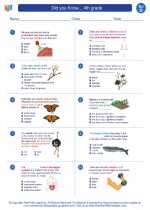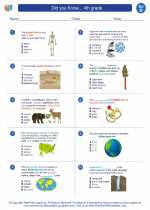Biogeochemical Cycles
Definition: Biogeochemical cycles are pathways through which nutrients and elements are exchanged between the living and non-living components of an ecosystem.
Types of Biogeochemical Cycles
- Water Cycle: The movement of water through the atmosphere, land, and living organisms.
- Nitrogen Cycle: The process by which nitrogen is converted between its various chemical forms.
- Carbon Cycle: The movement of carbon through the atmosphere, oceans, and living organisms.
- Phosphorus Cycle: The movement of phosphorus through the soil, water, and living organisms.
- Sulfur Cycle: The process by which sulfur is cycled through the atmosphere, rocks, and living organisms.
Key Processes in Biogeochemical Cycles
- Photosynthesis: The process by which plants and other organisms convert carbon dioxide and water into glucose and oxygen.
- Decomposition: The breakdown of organic matter by bacteria and fungi, releasing nutrients back into the environment.
- Nitrogen Fixation: The conversion of nitrogen gas into ammonia by certain bacteria, making it available for plant use.
- Weathering: The breakdown of rocks and minerals, releasing nutrients such as phosphorus into the soil and water.
Human Impact on Biogeochemical Cycles
Human activities, such as burning fossil fuels, deforestation, and industrial agriculture, can disrupt biogeochemical cycles, leading to environmental problems such as air and water pollution, climate change, and loss of biodiversity.
Study Tips
- Make flashcards to memorize key terms and concepts.
- Use diagrams to visualize the different biogeochemical cycles.
- Practice explaining the processes involved in each cycle to deepen your understanding.
- Discuss the impact of human activities on biogeochemical cycles to understand real-world implications.
◂Science Worksheets and Study Guides Fourth Grade. Did you Know... 4th grade
Study Guide Did you Know... 4th grade
Did you Know... 4th grade  Worksheet/Answer key
Worksheet/Answer key Did you Know... 4th grade
Did you Know... 4th grade  Worksheet/Answer key
Worksheet/Answer key Did you Know... 4th grade
Did you Know... 4th grade  Worksheet/Answer key
Worksheet/Answer key Did you Know... 4th grade
Did you Know... 4th grade 

 Worksheet/Answer key
Worksheet/Answer key
 Worksheet/Answer key
Worksheet/Answer key
 Worksheet/Answer key
Worksheet/Answer key

The resources above cover the following skills:
Core Ideas for Knowing Science
Life Science
Organisms are organized on a cellular basis and have a finite life span.